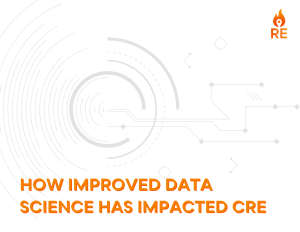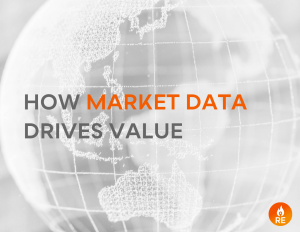Feature
Why CRE Brokers Don’t Share Transaction Data
Why Brokers Prefer Not to Share Commercial Real Estate Data on Transactions
Commercial real estate is well known for being an industry where information doesn’t flow freely. Very few brokers are willing to share commercial real estate data publicly, especially “closed” data.
Closed data is related to transactions or the sale of commercial real estate. Many commercial real estate transactions don’t happen within a listing system like the MLS. Instead, listing brokers work on bringing in buyers themselves. Sometimes a CRE broker already has buyers in mind before they become the listing broker.
If they can’t find a buyer in their own network, the broker will reach out to other agents on their team. Many listing brokers will also reach out to other trusted commercial brokers and agents if no one on their team has a serious buyer. If they can’t put the deal together through personal contacts, then they’ll put a listing on the market through Costar or LoopNet for the public to see.
Since most CRE listings aren’t “on the market,” there’s no commercial property data generated in a centralized database that other agents and brokers can access. Only the brokerages on the deal know the specifics of the sale.
Another issue is that traditionally, most CRE transactions don’t involve a buyer broker. The majority of commercial closes are handled solely by the listing team, which keeps the close data under even tighter lock and key.
As you can see everything is very guarded and a limited number of people are ever aware a commercial property was for sale and that the transaction data exists. Ultimately, this way of doing business largely benefits the listing broker and few others. They get the property data and all of the commission – it’s a win-win for the listing broker. Even the brokers that specialize in helping CRE buyers have to do a lot of legwork to build their own database based on their closed deals.
Catch up on the latest from RefineRE:
Commercial Real Estate Transaction Data from the Broker Perspective
Historically, the way commercial real estate transactions have been done is preferable for the listing broker because there are fewer commission splits. But now there’s another reason for them to keep CRE transactions off the commercial real estate market.
If you’re a commercial real estate broker that’s been watching the growth of Proptech, you’re beginning to understand the value of your data. However, that value mostly lies in what you do with your data center.
Sharing transaction data is probably the last thing most CRE brokers are inclined to do. CRE brokers work very hard to land clients, find interested investors, and close deals. It can take years of work to get a deal done. It’s understandable for the broker to consider the data involved as part of their sweat equity.
That data center is also part of the value that brokers bring to their clients. For some CRE brokers, transaction data is their UVP. Insider information is how they gain clients.
When you think about it in those terms it’s easy to see why CRE brokers would want to keep transaction data to themselves.
An instance when brokers are open to sharing their transaction data is if they work in a team setting and are allowing others on their team to take a look. The only other reason a CRE broker or company would willingly share their asset data is if they are getting paid for it.
Now CRE companies and brokers are beginning to realize that data influences way more than valuations. Some CRE firms that have years of data locked away could find it’s their most valuable asset today in the commercial real estate industry. Transaction data is a part of a larger pie with information on everything from leasing trends to utilization rates baked right in.
The problem for a commercial real estate company, or anyone else wanting to benefit from their data, is that they lack the organization, infrastructure, and technological know-how to really learn all that the data analytics has to tell.
How CRE Portfolio Managers Can Take Advantage of Their Own Commercial Real Estate Data
Everyone in commercial real estate is beginning to grasp what their data can do for them and their clients. Reduced operating costs, improved returns, enhanced client acquisition, identification of an oncoming trend – it’s all possible when you have CRE data.
But first and foremost, you have to be able to access commercial real estate data to take advantage of it. Ultimately, that means you can’t rely on private CRE transaction data. You have to be able to gather and analyze your own commercial real estate data in a scalable way.
Data analysis is a major part of the CRE tech revolution. CRE data analytics tools like RefineRE are designed to overcome the data access issues of the past. With little to no analysis expertise, corporate occupiers can use advanced data mining techniques to aggregate information from a wide range of sources, automatically visualize the data, and track metrics.
The newest platforms have next-level tools like benchmarking and portfolio trend tracking that are amazingly easy to use. The data is deciphered and put into reports that make the information more digestible and usable. Now, advanced technology like predictive analytics and artificial intelligence are even allowing commercial real estate professionals to project forward into the future.
CRE brokers and companies are sitting on a treasure trove of commercial real estate data, and technology companies like RefineRE have the key to unlocking it and turning it into their biggest asset. Now that technology companies and CRE companies are coming together, we may see a significant change in how commercial real estate data is shared in this industry.
To learn more about gaining access to a world of CRE data, schedule a 15-minute consultation with us.
Catch up on the latest from RefineRE:
Schedule a consultation with RefineRE
Here's what you can expect:
- ‣ A 15-minute call
- ‣ Identify your biggest challenges
- ‣ Explore automated solutions to optimize your strategy





